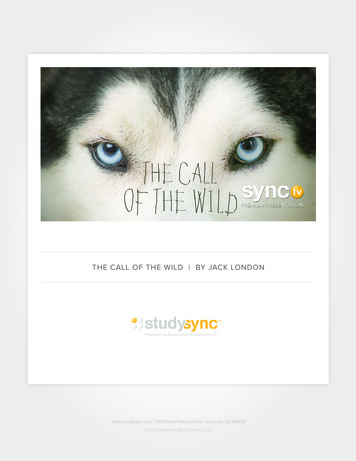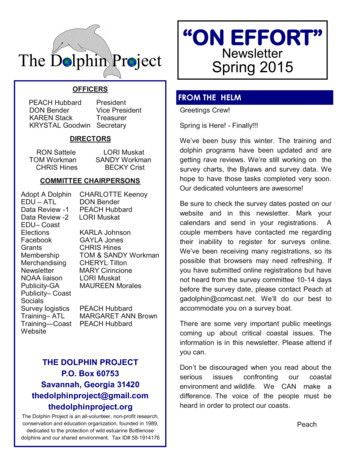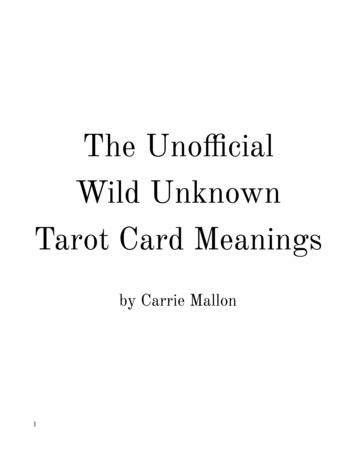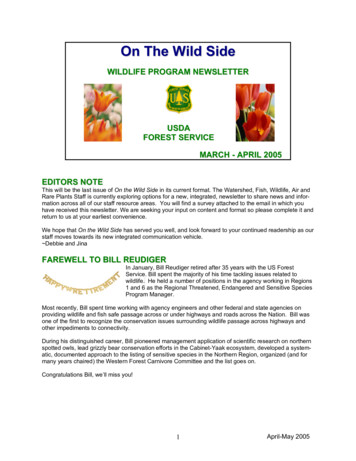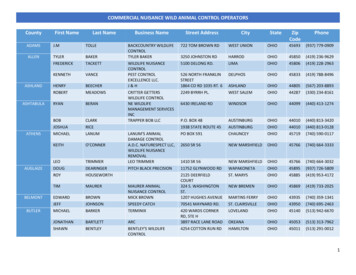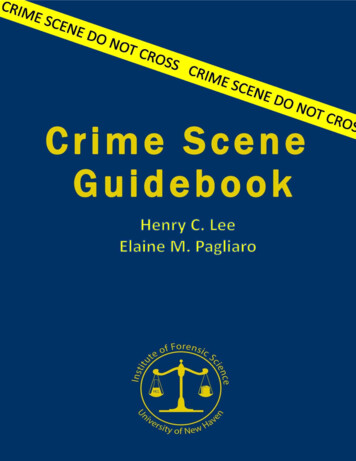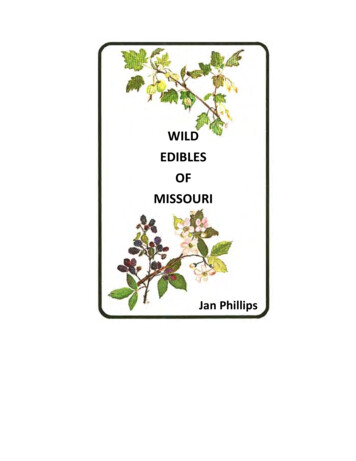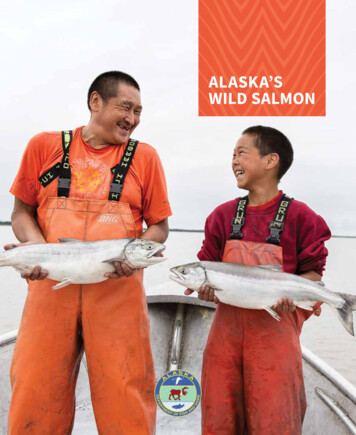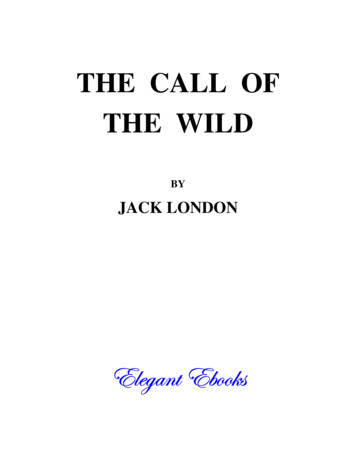
Transcription
THE CALL OFTHE WILDBYJACK LONDON7 WYS f f 77Taa]e
COPYRIGHT INFORMATIONBook: The Call of the WildAuthor: Jack London, 1876–1916First published: 1903The original book is in the public domain in the United States and inmost, if not all, other countries as well. Readers outside the UnitedStates should check their own countries’ copyright laws to be certainthey can legally download this ebook. The Online Books Page has anFAQ which gives a summary of copyright durations for many othercountries, as well as links to more official sources. (Links will open in anew window.)This PDF ebookwas created by José Menéndez.
CONTENTSI.II.III.IV.V.VI.VII.INTO THE PRIMITIVETHE LAW OF CLUB AND FANGTHE DOMINANT PRIMORDIAL BEASTWHO HAS WON TO MASTERSHIPTHE TOIL OF TRACE AND TRAILFOR THE LOVE OF A MANTHE SOUNDING OF THE CALL
IINTO THE PRIMITIVE“Old longings nomadic leap,Chafing at custom’s chain,Again from its brumal sleepWakens the ferine strain.”BUCK did not read the newspapers, or he would have known thattrouble was brewing, not alone for himself, but for every tidewater dog, strong of muscle and with warm, long hair, fromPuget Sound to San Diego. Because men, groping in the Arctic darkness,had found a yellow metal, and because steamship and transportationcompanies were booming the find, thousands of men were rushing intothe Northland. These men wanted dogs, and the dogs they wanted wereheavy dogs, with strong muscles by which to toil, and furry coats toprotect them from the frost.Buck lived at a big house in the sun-kissed Santa Clara Valley. JudgeMiller’s place, it was called. It stood back from the road, half hiddenamong the trees, through which glimpses could be caught of the widecool veranda that ran around its four sides. The house was approachedby gravelled driveways which wound about through wide-spreadinglawns and under the interlacing boughs of tall poplars. At the rear thingswere on even a more spacious scale than at the front. There were greatstables, where a dozen grooms and boys held forth, rows of vine-cladservants’ cottages, an endless and orderly array of outhouses, long grape5
6THE CALL OF THE WILDarbors, green pastures, orchards, and berry patches. Then there was thepumping plant for the artesian well, and the big cement tank whereJudge Miller’s boys took their morning plunge and kept cool in the hotafternoon.And over this great demesne Buck ruled. Here he was born, and herehe had lived the four years of his life. It was true, there were other dogs.There could not but be other dogs on so vast a place, but they did notcount. They came and went, resided in the populous kennels, or livedobscurely in the recesses of the house after the fashion of Toots, theJapanese pug, or Ysabel, the Mexican hairless,—strange creatures thatrarely put nose out of doors or set foot to ground. On the other hand,there were the fox terriers, a score of them at least, who yelped fearfulpromises at Toots and Ysabel looking out of the windows at them andprotected by a legion of housemaids armed with brooms and mops.But Buck was neither house-dog nor kennel-dog. The whole realmwas his. He plunged into the swimming tank or went hunting with theJudge’s sons; he escorted Mollie and Alice, the Judge’s daughters, onlong twilight or early morning rambles; on wintry nights he lay at theJudge’s feet before the roaring library fire; he carried the Judge’sgrandsons on his back, or rolled them in the grass, and guarded theirfootsteps through wild adventures down to the fountain in the stableyard, and even beyond, where the paddocks were, and the berry patches.Among the terriers he stalked imperiously, and Toots and Ysabel heutterly ignored, for he was king,—king over all creeping, crawling,flying things of Judge Miller’s place, humans included.His father, Elmo, a huge St. Bernard, had been the Judge’sinseparable companion, and Buck bid fair to follow in the way of hisfather. He was not so large,—he weighed only one hundred and fortypounds,—for his mother, Shep, had been a Scotch shepherd dog.Nevertheless, one hundred and forty pounds, to which was added thedignity that comes of good living and universal respect, enabled him tocarry himself in right royal fashion. During the four years since hispuppyhood he had lived the life of a sated aristocrat; he had a fine pridein himself, was even a trifle egotistical, as country gentlemen sometimesbecome because of their insular situation. But he had saved himself by
INTO THE PRIMITIVE7not becoming a mere pampered house-dog. Hunting and kindred outdoordelights had kept down the fat and hardened his muscles; and to him, asto the cold-tubbing races, the love of water had been a tonic and a healthpreserver.And this was the manner of dog Buck was in the fall of 1897, whenthe Klondike strike dragged men from all the world into the frozenNorth. But Buck did not read the newspapers, and he did not know thatManuel, one of the gardener’s helpers, was an undesirable acquaintance.Manuel had one besetting sin. He loved to play Chinese lottery. Also, inhis gambling, he had one besetting weakness—faith in a system; and thismade his damnation certain. For to play a system requires money, whilethe wages of a gardener’s helper do not lap over the needs of a wife andnumerous progeny.The Judge was at a meeting of the Raisin Growers’ Association, andthe boys were busy organizing an athletic club, on the memorable nightof Manuel’s treachery. No one saw him and Buck go off through theorchard on what Buck imagined was merely a stroll. And with theexception of a solitary man, no one saw them arrive at the little flagstation known as College Park. This man talked with Manuel, andmoney chinked between them.“You might wrap up the goods before you deliver ’m,” the strangersaid gruffly, and Manuel doubled a piece of stout rope around Buck’sneck under the collar.“Twist it, an’ you’ll choke ’m plentee,” said Manuel, and thestranger grunted a ready affirmative.Buck had accepted the rope with quiet dignity. To be sure, it was anunwonted performance: but he had learned to trust in men he knew, andto give them credit for a wisdom that outreached his own. But when theends of the rope were placed in the stranger’s hands, he growledmenacingly. He had merely intimated his displeasure, in his pridebelieving that to intimate was to command. But to his surprise the ropetightened around his neck, shutting off his breath. In quick rage hesprang at the man, who met him halfway, grappled him close by thethroat, and with a deft twist threw him over on his back. Then the ropetightened mercilessly, while Buck struggled in a fury, his tongue lolling
8THE CALL OF THE WILDout of his mouth and his great chest panting futilely. Never in all his lifehad he been so vilely treated, and never in all his life had he been soangry. But his strength ebbed, his eyes glazed, and he knew nothingwhen the train was flagged and the two men threw him into the baggagecar.The next he knew, he was dimly aware that his tongue was hurtingand that he was being jolted along in some kind of a conveyance. Thehoarse shriek of a locomotive whistling a crossing told him where hewas. He had travelled too often with the Judge not to know the sensationof riding in a baggage car. He opened his eyes, and into them came theunbridled anger of a kidnapped king. The man sprang for his throat, butBuck was too quick for him. His jaws closed on the hand, nor did theyrelax till his senses were choked out of him once more.“Yep, has fits,” the man said, hiding his mangled hand from thebaggageman, who had been attracted by the sounds of struggle. “I’mtakin’ ’m up for the boss to ’Frisco. A crack dog-doctor there thinks thathe can cure ’m.”Concerning that night’s ride, the man spoke most eloquently forhimself, in a little shed, back of a saloon on the San Francisco waterfront.“All I get is fifty for it,” he grumbled; “an’ I wouldn’t do it over for athousand, cold cash.”His hand was wrapped in a bloody handkerchief, and the righttrouser leg was ripped from knee to ankle.“How much did the other mug get?” the saloon-keeper demanded.“A hundred,” was the reply. “Wouldn’t take a sou less, so help me.”“That makes a hundred and fifty,” the saloon-keeper calculated; “andhe’s worth it, or I’m a squarehead.”The kidnapper undid the bloody wrappings and looked at hislacerated hand. “If I don’t get the hydrophoby—”“It’ll be because you was born to hang,” laughed the saloon-keeper.“Here, lend me a hand before you pull your freight,” he added.Dazed, suffering intolerable pain from throat and tongue, with thelife half throttled out of him, Buck attempted to face his tormentors. Buthe was thrown down and choked repeatedly, till they succeeded in filing
INTO THE PRIMITIVE9the heavy brass collar from off his neck. Then the rope was removed,and he was flung into a cagelike crate.There he lay for the remainder of the weary night, nursing his wrathand wounded pride. He could not understand what it all meant. What didthey want with him, these strange men? Why were they keeping himpent up in this narrow crate? He did not know why, but he felt oppressedby the vague sense of impending calamity. Several times during thenight he sprang to his feet when the shed door rattled open, expecting tosee the Judge, or the boys at least. But each time it was the bulging faceof the saloon-keeper that peered in at him by the sickly light of a tallowcandle. And each time the joyful bark that trembled in Buck’s throat wastwisted into a savage growl.But the saloon-keeper let him alone, and in the morning four menentered and picked up the crate. More tormentors, Buck decided, forthey were evil-looking creatures, ragged and unkempt; and he stormedand raged at them through the bars. They only laughed and poked sticksat him, which he promptly assailed with his teeth till he realized that thatwas what they wanted. Whereupon he lay down sullenly and allowed thecrate to be lifted into a wagon. Then he, and the crate in which he wasimprisoned, began a passage through many hands. Clerks in the expressoffice took charge of him; he was carted about in another wagon; a truckcarried him, with an assortment of boxes and parcels, upon a ferrysteamer; he was trucked off the steamer into a great railway depot, andfinally he was deposited in an express car.For two days and nights this express car was dragged along at the tailof shrieking locomotives; and for two days and nights Buck neither atenor drank. In his anger he had met the first advances of the expressmessengers with growls, and they had retaliated by teasing him. Whenhe flung himself against the bars, quivering and frothing, they laughed athim and taunted him. They growled and barked like detestable dogs,mewed, and flapped their arms and crowed. It was all very silly, heknew; but therefore the more outrage to his dignity, and his anger waxedand waxed. He did not mind the hunger so much, but the lack of watercaused him severe suffering and fanned his wrath to fever pitch. For thatmatter, high-strung and finely sensitive, the ill treatment had flung him
10THE CALL OF THE WILDinto a fever, which was fed by the inflammation of his parched andswollen throat and tongue.He was glad for one thing: the rope was off his neck. That had giventhem an unfair advantage; but now that it was off, he would show them.They would never get another rope around his neck. Upon that he wasresolved. For two days and nights he neither ate nor drank, and duringthose two days and nights of torment, he accumulated a fund of wraththat boded ill for whoever first fell foul of him. His eyes turnedbloodshot, and he was metamorphosed into a raging fiend. So changedwas he that the Judge himself would not have recognized him; and theexpress messengers breathed with relief when they bundled him off thetrain at Seattle.Four men gingerly carried the crate from the wagon into a small,high-walled back yard. A stout man, with a red sweater that saggedgenerously at the neck, came out and signed the book for the driver. Thatwas the man, Buck divined, the next tormentor, and he hurled himselfsavagely against the bars. The man smiled grimly, and brought a hatchetand a club.“You ain’t going to take him out now?” the driver asked.“Sure,” the man replied, driving the hatchet into the crate for a pry.There was an instantaneous scattering of the four men who hadcarried it in, and from safe perches on top the wall they prepared towatch the performance.Buck rushed at the splintering wood, sinking his teeth into it, surgingand wrestling with it. Wherever the hatchet fell on the outside, he wasthere on the inside, snarling and growling, as furiously anxious to get outas the man in the red sweater was calmly intent on getting him out.“Now, you red-eyed devil,” he said, when he had made an openingsufficient for the passage of Buck’s body. At the same time he droppedthe hatchet and shifted the club to his right hand.And Buck was truly a red-eyed devil, as he drew himself together forthe spring, hair bristling, mouth foaming, a mad glitter in his bloodshoteyes. Straight at the man he launched his one hundred and forty poundsof fury, surcharged with the pent passion of two days and nights. In midair, just as his jaws were about to close on the man, he received a shock
INTO THE PRIMITIVE11that checked his body and brought his teeth together with an agonizingclip. He whirled over, fetching the ground on his back and side. He hadnever been struck by a club in his life, and did not understand. With asnarl that was part bark and more scream he was again on his feet andlaunched into the air. And again the shock came and he was broughtcrushingly to the ground. This time he was aware that it was the club,but his madness knew no caution. A dozen times he charged, and asoften the club broke the charge and smashed him down.After a particularly fierce blow, he crawled to his feet, too dazed torush. He staggered limply about, the blood flowing from nose and mouthand ears, his beautiful coat sprayed and flecked with bloody slaver. Thenthe man advanced and deliberately dealt him a frightful blow on thenose. All the pain he had endured was as nothing compared with theexquisite agony of this. With a roar that was almost lionlike in itsferocity, he again hurled himself at the man. But the man, shifting theclub from right to left, coolly caught him by the under jaw, at the sametime wrenching downward and backward. Buck described a completecircle in the air, and half of another, then crashed to the ground on hishead and chest.For the last time he rushed. The man struck the shrewd blow he hadpurposely withheld for so long, and Buck crumpled up and went down,knocked utterly senseless.“He’s no slouch at dog-breakin’, that’s wot I say,” one of the men onthe wall cried enthusiastically.“Druther break cayuses any day, and twice on Sundays,” was thereply of the driver, as he climbed on the wagon and started the horses.Buck’s senses came back to him, but not his strength. He lay wherehe had fallen, and from there he watched the man in the red sweater.“ ‘Answers to the name of Buck,’ ” the man soliloquized, quotingfrom the saloon-keeper’s letter which had announced the consignment ofthe crate and contents. “Well, Buck, my boy,” he went on in a genialvoice, “we’ve had our little ruction, and the best thing we can do is to letit go at that. You’ve learned your place, and I know mine. Be a good dogand all’ll go well and the goose hang high. Be a bad dog, and I’ll whalethe stuffin’ outa you. Understand?”
12THE CALL OF THE WILDAs he spoke he fearlessly patted the head he had so mercilesslypounded, and though Buck’s hair involuntarily bristled at touch of thehand, he endured it without protest. When the man brought him water hedrank eagerly, and later bolted a generous meal of raw meat, chunk bychunk, from the man’s hand.He was beaten (he knew that); but he was not broken. He saw, oncefor all, that he stood no chance against a man with a club. He hadlearned the lesson, and in all his after life he never forgot it. That clubwas a revelation. It was his introduction to the reign of primitive law,and he met the introduction halfway. The facts of life took on a fierceraspect; and while he faced that aspect uncowed, he faced it with all thelatent cunning of his nature aroused. As the days went by, other dogscame, in crates and at the ends of ropes, some docilely, and some ragingand roaring as he had come; and, one and all, he watched them passunder the dominion of the man in the red sweater. Again and again, ashe looked at each brutal performance, the lesson was driven home toBuck: a man with a club was a lawgiver, a master to be obeyed, thoughnot necessarily conciliated. Of this last Buck was never guilty, though hedid see beaten dogs that fawned upon the man, and wagged their tails,and licked his hand. Also he saw one dog, that would neither conciliatenor obey, finally killed in the struggle for mastery.Now and again men came, strangers, who talked excitedly,wheedlingly, and in all kinds of fashions to the man in the red sweater.And at such times that money passed between them the strangers tookone or more of the dogs away with them. Buck wondered where theywent, for they never came back; but the fear of the future was strongupon him, and he was glad each time when he was not selected.Yet his time came, in the end, in the form of a little weazened manwho spat broken English and many strange and uncouth exclamationswhich Buck could not understand.“Sacredam!” he cried, when his eyes lit upon Buck. “Dat one dambully dog! Eh? How moch?”“Three hundred, and a present at that,” was the prompt reply of theman in the red sweater. “And seein’ it’s government money, you ain’tgot no kick coming, eh, Perrault?”
INTO THE PRIMITIVE13Perrault grinned. Considering that the price of dogs had beenboomed skyward by the unwonted demand, it was not an unfair sum forso fine an animal. The Canadian Government would be no loser, norwould its despatches travel the slower. Perrault knew dogs, and when helooked at Buck he knew that he was one in a thousand—“One in tent’ousand,” he commented mentally.Buck saw money pass between them, and was not surprised whenCurly, a good-natured Newfoundland, and he were led away by the littleweazened man. That was the last he saw of the man in the red sweater,and as Curly and he looked at receding Seattle from the deck of theNarwhal, it was the last he saw of the warm Southland. Curly and hewere taken below by Perrault and turned over to a black-faced giantcalled François. Perrault was a French-Canadian, and swarthy; butFrançois was a French-Canadian half-breed, and twice as swarthy. Theywere a new kind of men to Buck (of which he was destined to see manymore), and while he developed no affection for them, he none the lessgrew honestly to respect them. He speedily learned that Perrault andFrançois were fair men, calm and impartial in administering justice, andtoo wise in the way of dogs to be fooled by dogs.In the ’tween-decks of the Narwhal, Buck and Curly joined twoother dogs. One of them was a big, snow-white fellow from Spitzbergenwho had been brought away by a whaling captain, and who had lateraccompanied a Geological Survey into the Barrens.He was friendly, in a treacherous sort of way, smiling into one’s facethe while he meditated some underhand trick, as, for instance, when hestole from Buck’s food at the first meal. As Buck sprang to punish him,the lash of François’s whip sang through the air, reaching the culpritfirst; and nothing remained to Buck but to recover the bone. That wasfair of François, he decided, and the half-breed began his rise in Buck’sestimation.The other dog made no advances, nor received any; also, he did notattempt to steal from the newcomers. He was a gloomy, morose fellow,and he showed Curly plainly that all he desired was to be left alone, andfurther, that there would be trouble if he were not left alone. “Dave” hewas called, and he ate and slept, or yawned between times, and took
14THE CALL OF THE WILDinterest in nothing, not even when the Narwhal crossed Queen CharlotteSound and rolled and pitched and bucked like a thing possessed. WhenBuck and Curly grew excited, half wild with fear, he raised his head asthough annoyed, favored them with an incurious glance, yawned, andwent to sleep again.Day and night the ship throbbed to the tireless pulse of the propeller,and though one day was very like another, it was apparent to Buck thatthe weather was steadily growing colder. At last, one morning, thepropeller was quiet, and the Narwhal was pervaded with an atmosphereof excitement. He felt it, as did the other dogs, and knew that a changewas at hand. François leashed them and brought them on deck. At thefirst step upon the cold surface, Buck’s feet sank into a white mushysomething very like mud. He sprang back with a snort. More of thiswhite stuff was falling through the air. He shook himself, but more of itfell upon him. He sniffed it curiously, then licked some up on histongue. It bit like fire, and the next instant was gone. This puzzled him.He tried it again, with the same result. The onlookers laugheduproariously, and he felt ashamed, he knew not why, for it was his firstsnow.
IITHE LAW OF CLUB AND FANGBUCK’S first day on the Dyea beach was like a nightmare. Everyhour was filled with shock and surprise. He had been suddenlyjerked from the heart of civilization and flung into the heart ofthings primordial. No lazy, sun-kissed life was this, with nothing to dobut loaf and be bored. Here was neither peace, nor rest, nor a moment’ssafety. All was confusion and action, and every moment life and limbwere in peril. There was imperative need to be constantly alert; for thesedogs and men were not town dogs and men. They were savages, all ofthem, who knew no law but the law of club and fang.He had never seen dogs fight as these wolfish creatures fought, andhis first experience taught him an unforgetable lesson. It is true, it was avicarious experience, else he would not have lived to profit by it. Curlywas the victim. They were camped near the log store, where she, in herfriendly way, made advances to a husky dog the size of a full-grownwolf, though not half so large as she. There was no warning, only a leapin like a flash, a metallic clip of teeth, a leap out equally swift, andCurly’s face was ripped open from eye to jaw.It was the wolf manner of fighting, to strike and leap away; but therewas more to it than this. Thirty or forty huskies ran to the spot andsurrounded the combatants in an intent and silent circle. Buck did notcomprehend that silent intentness, nor the eager way with which theywere licking their chops. Curly rushed her antagonist, who struck againand leaped aside. He met her next rush with his chest, in a peculiarfashion that tumbled her off her feet. She never regained them. This was15
16THE CALL OF THE WILDwhat the onlooking huskies had waited for. They closed in upon her,snarling and yelping, and she was buried, screaming with agony, beneaththe bristling mass of bodies.So sudden was it, and so unexpected, that Buck was taken aback. Hesaw Spitz run out his scarlet tongue in a way he had of laughing; and hesaw François, swinging an axe, spring into the mess of dogs. Three menwith clubs were helping him to scatter them. It did not take long. Twominutes from the time Curly went down, the last of her assailants wereclubbed off. But she lay there limp and lifeless in the bloody, trampledsnow, almost literally torn to pieces, the swart half-breed standing overher and cursing horribly. The scene often came back to Buck to troublehim in his sleep. So that was the way. No fairplay. Once down, that wasthe end of you. Well, he would see to it that he never went down. Spitzran out his tongue and laughed again, and from that moment Buck hatedhim with a bitter and deathless hatred.Before he had recovered from the shock caused by the tragic passingof Curly, he received another shock. François fastened upon him anarrangement of straps and buckles. It was a harness, such as he had seenthe grooms put on the horses at home. And as he had seen horses work,so he was set to work, hauling François on a sled to the forest thatfringed the valley, and returning with a load of firewood. Though hisdignity was sorely hurt by thus being made a draught animal, he was toowise to rebel. He buckled down with a will and did his best, though itwas all new and strange. François was stern, demanding instantobedience, and by virtue of his whip receiving instant obedience; whileDave, who was an experienced wheeler, nipped Buck’s hind quarterswhenever he was in error. Spitz was the leader, likewise experienced,and while he could not always get at Buck, he growled sharp reproofnow and again, or cunningly threw his weight in the traces to jerk Buckinto the way he should go. Buck learned easily, and under the combinedtuition of his two mates and François made remarkable progress. Erethey returned to camp he knew enough to stop at “ho,” to go ahead at“mush,” to swing wide on the bends, and to keep clear of the wheelerwhen the loaded sled shot downhill at their heels.
THE LAW OF CLUB AND FANG17“T’ree vair’ good dogs,” François told Perrault. “Dat Buck, heempool lak hell. I tich heem queek as anyt’ing.”By afternoon, Perrault, who was in a hurry to be on the trail with hisdespatches, returned with two more dogs. “Billee” and “Joe” he calledthem, two brothers, and true huskies both. Sons of the one motherthough they were, they were as different as day and night. Billee’s onefault was his excessive good nature, while Joe was the very opposite,sour and introspective, with a perpetual snarl and a malignant eye. Buckreceived them in comradely fashion, Dave ignored them, while Spitzproceeded to thrash first one and then the other. Billee wagged his tailappeasingly, turned to run when he saw that appeasement was of noavail, and cried (still appeasingly) when Spitz’s sharp teeth scored hisflank. But no matter how Spitz circled, Joe whirled around on his heelsto face him, mane bristling, ears laid back, lips writhing and snarling,jaws clipping together as fast as he could snap, and eyes diabolicallygleaming—the incarnation of belligerent fear. So terrible was hisappearance that Spitz was forced to forego disciplining him; but to coverhis own discomfiture he turned upon the inoffensive and wailing Billeeand drove him to the confines of the camp.By evening Perrault secured another dog, an old husky, long andlean and gaunt, with a battle-scarred face and a single eye which flasheda warning of prowess that commanded respect. He was called Sol-leks,which means the Angry One. Like Dave, he asked nothing, gavenothing, expected nothing; and when he marched slowly anddeliberately into their midst, even Spitz left him alone. He had onepeculiarity which Buck was unlucky enough to discover. He did not liketo be approached on his blind side. Of this offence Buck was unwittinglyguilty, and the first knowledge he had of his indiscretion was when Solleks whirled upon him and slashed his shoulder to the bone for threeinches up and down. Forever after Buck avoided his blind side, and tothe last of their comradeship had no more trouble. His only apparentambition, like Dave’s, was to be left alone; though, as Buck wasafterward to learn, each of them possessed one other and even more vitalambition.
18THE CALL OF THE WILDThat night Buck faced the great problem of sleeping. The tent,illumined by a candle, glowed warmly in the midst of the white plain;and when he, as a matter of course, entered it, both Perrault and Françoisbombarded him with curses and cooking utensils, till he recovered fromhis consternation and fled ignominiously into the outer cold. A chillwind was blowing that nipped him sharply and bit with especial venominto his wounded shoulder. He lay down on the snow and attempted tosleep, but the frost soon drove him shivering to his feet. Miserable anddisconsolate, he wandered about among the many tents, only to find thatone place was as cold as another. Here and there savage dogs rushedupon him, but he bristled his neck hair and snarled (for he was learningfast), and they let him go his way unmolested.Finally an idea came to him. He would return and see how his ownteam-mates were making out. To his astonishment, they haddisappeared. Again he wandered about through the great camp, lookingfor them, and again he returned. Were they in the tent? No, that couldnot be, else he would not have been driven out. Then where could theypossibly be? With drooping tail and shivering body, very forlorn indeed,he aimlessly circled the tent. Suddenly the snow gave way beneath hisfore legs and he sank down. Something wriggled under his feet. Hesprang back, bristling and snarling, fearful of the unseen and unknown.But a friendly little yelp reassured him, and he went back to investigate.A whiff of warm air ascended to his nostrils, and there, curled up underthe snow in a snug ball, lay Billee. He whined placatingly, squirmed andwriggled to show his good will and intentions, and even ventured, as abribe for peace, to lick Buck’s face with his warm wet tongue.Another lesson. So that was the way they did it, eh? Buckconfidently selected a spot, and with much fuss and waste effortproceeded to dig a hole for himself. In a trice the heat from his bodyfilled the confined space and he was asleep. The day had been long andarduous, and he slept soundly and comfortably, though he growled andbarked and wrestled with bad dreams.Nor did he open his eyes till roused by the noises of the wakingcamp. At first he did not know where he was. It had snowed during thenight and he was completely buried. The snow walls pressed him on
THE LAW OF CLUB AND FANG19every side, and a great surge of fear swept through him—the fear of thewild thing for the trap. It was a token that he was harking b
this pdf ebook was created by josé menéndez. contents i. into the primitive ii. the law of club and fang iii. the dominant primordial beast iv. w ho has w on to mastership v. the toil of trace and trail vi. for the love of a
